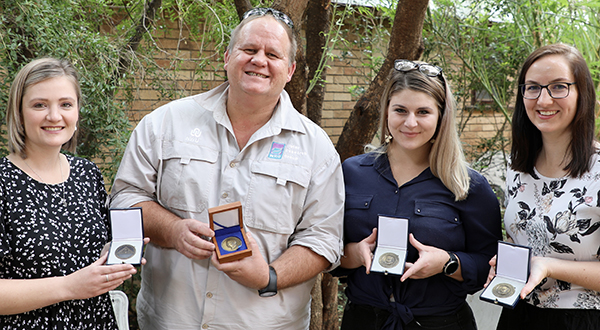Parasites may be viewed by many as pesky organisms,but understanding them and their impact on ecological systems is crucial in nature studies. The researchers and students at the North-West University (NWU) excel as experts in this field.
The NWU made history during the recent International Congress of Parasites of Wildlife by not only winning all the medals for postgraduates but also receiving the most coveted award for a researcher.
The congress was hosted by the Parasitological Society of Southern Africa (PARSA) at the Kruger National Park in September. “It is the first time in the history of PARSA that a single university received all four the available medals that are presented annually to postgraduates and researchers,” says Prof Nico Smit from the School of Biological Sciences, who received the highest honour from PARSA.
He was awarded the Elsdon-Dew Medal for his significant research contributions to the advancement of parasitology in Africa. Only 24 researchers have received this prestigious medal in the 50-year history of PARSA.
“As a young researcher, I used to admire my mentors and role models when they received accolades such as this one. It is wonderful to follow in their footsteps,” says Prof Nico. He explains that the award is mostly given for a lifetime of contributions – with most recipients nearing the end of their careers. This makes the achievement even greater, as he is still in the prime of his career.
NWU’s postgraduates are the cream of the crop
Dr Marliese Truter and Linda van der Spuy received the Senior Neitz Medal for the best PhD thesis and the Junior Neitz Medal for the best MSc dissertation respectively.
Dr Anja Erasmus was awarded the Angela Davis Russell Medal for the best publication in parasitology by a postgraduate student.
Marliese says receiving the medal is wonderful and unexpected. “Just to be nominated for an award of this nature is great enough, but receiving the award feels like confirmation that I am on the right track to contribute to the field of parasitology in South Africa.”
Her research centres around parasite communities of southern African fish species. Her PhD study focuses on the African sharptooth catfish (barbel/baber), which carries the most diverse parasite community in Africa.
Linda says receiving the medal for the best master’s-degree dissertation humbled her. “There is an unimaginable joy that comes when you realise that your regular and gradual persistence is being noticed and appreciated by current and future colleagues.”
Her research involves taxonomic research of cestodes (tapeworms) that infect sharks and batoids off the coast of South Africa. She has already discovered and described seven species of Acanthobothrium and one species of Phoreiobothrium new to science.
According to Anja, getting validation for her new-found interest in parasitology, after initially researching ecotoxicology, gives her great joy.
She received the Angela Davies Russell Award for her publication “Metazoan parasite diversity of the endemic South African intertidal klipfish, Clinus superciliosus: Factors influencing parasite community composition”.
Her research identifies factors that influence the metazoan parasite community composition of the klipfish within its South African distribution.
Prof Nico concludes that the NWU is a regular recipient of medals in parasitology. “These awards showcase the quality and leadership of our postgraduates, supervisors and staff.”
For more information on PARSA, visit: PARSA (Parasitological Society of Southern Africa).
In addition to the great achievements by the NWU at the International Congress of Parasites of Wildlife, NWU staff members Dr Courtney Cook and Dr Kerry Malherbe were elected as the new vice-president and president, respectively, of the Parasitological Society of Southern Africa (PARSA). They will serve in these capacities for the next three years.

Doing the NWU proud ― Dr Anja Erasmus, Prof Nico Smith, Linda van der Spuy and Dr Marliese Truter took home all the medals for postgraduate students during the international congress. Prof Nico received the highest honour the Parasitological Society of Southern Africa can bestow upon a researcher.
